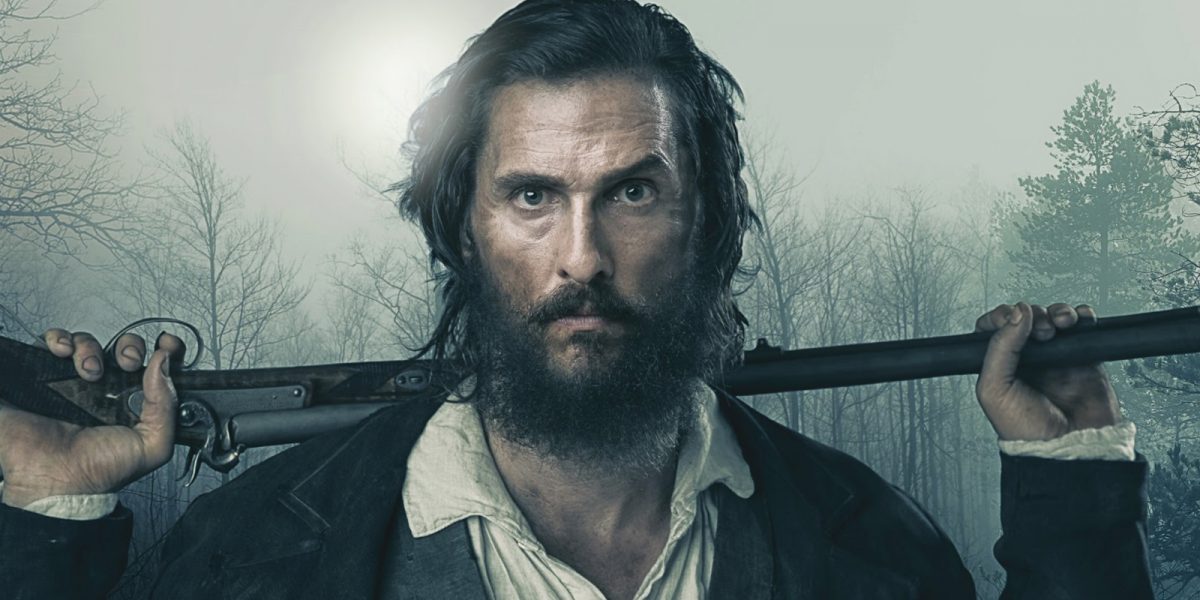 (4 / 5)
(4 / 5)
Almost twenty years on from Spielberg’s Amistad, who would have thought that we’d be talking about any film that doesn’t see Matthew McConaughey as a serious Oscar contender as something of a disappointment?
Opening in the midst of the American Civil War with a battalion of grey-suited Confederate soldiers marching calmly to their deaths – their ranks thinning as the least fortunate among them fall underfoot – Gary Ross’ Free State of Jones initially feels more like reenactment than dramatization.
There’s an unadornedness to Benoît Delhomme’s clear-eyed cinematography and Nicholas Brittell’s low-key score that connects beautifully with the scope of writer-director Ross’ screenplay, which lays out the life story and rebellion of Newton Knight (Matthew McConaughey) and the impact it had upon the people of Jones County, Mississippi.
McConaughey’s Newton is an intense, hollow-cheeked humanist. A spiritual Unionist who understands instinctively that people shouldn’t own people and any war that excludes slave owners is a rich man’s war, he sets out to take his nephew’s body home from the battlefield and ends up leading an armed rebellion.
From the burning farmhouses of homesteaders picked clean by Confederacy “taxation” to the swampland where Newton holes up with his expanding force of supporters, like Robin Hood in Sherwood Forest, the film details the storminess of the Reconstruction Era with the Newton as its calm, un-shifting eye.
https://www.youtube.com/watch? v=gRTMjAN3mpw
At 140 minutes in length, Free State of Jones feels, at points, more like a compacted HBO miniseries than a cinematic feature. It’s this, though, that lends the film, perhaps, its most notable feature: restraint.
Rather than the self-loathing outwardly monstrous plantation owner of Steve McQueen’s 12 Years a Slave, the hypocrisy on display here is more subtle and the violence takes place largely off-screen. The unspoken fear of Rachel (Gugu Mbatha-Raw), her eyes widening, at the soft footstep of her lecherous master on the stair; the disbelieving fury of Moses (Mahershala Ali, in what promises to be a breakout year) at the forced “apprenticeship” of his son; state-sanctioned slavery by another name.
As Newton, McConaughey quietly seethes. His lips twitch as he plainly rebuts Confederate talk of noble purpose – “He died with honor”, “No. He just died”. Upon learning of the abuse of Rachel, his future wife, he is almost sick with anger. Nevertheless, Free State of Jones is not incendiary.
This focus on the consequence of atrocity rather than the atrocity itself – the bloody stripes soaking through cloth, the body found hanging from a tree – might feel coy or avoidant, but its matter-of-fact-ness sets the film apart from works with whose genuine passion and outrage it cannot compete. Instead it gives us injustice in the image of pink ballot slips falling into a jar and a tally that does not match the vote.
Brief sequences set in the 1960s, concerning the trial of Newton’s great-great-grandson, Davis Knight (Brian Lee Franklin), on the charge of breaking the anti-miscegenation laws, are jarringly removed from the smoke and dirt of a century prior. Still, unlike, say, Sean Penn’s infamously detached lift-bound non-sequiturs in Tree of Life, they serve to illustrate a point: that history is a part of us, as we are of history, and that, sooner or later, for better or worse, it overtakes us all.
Free State of a Jones is a film that seems content to let that happen; to essay a particular time and place, to rely on period photos and expository text to fill in the gaps in its otherwise flowing narrative. Despite this, it remains a mostly elegant work of cinema.
While unlikely to secure any of its cast an Oscar nod (though McConaughey might get one for Gold and Ali for Moonlight), it’s a worthy, and not simply “worthy”, quietly impassioned addition to the canon. A measured libertarian-humanist parable, Free State of Jones will not doubt get overlooked in the wake of the reportedly barnstorming Birth of a Nation – whose controversy comes from more than its choice of historical personage – but there’s a lot here to admire; if not necessarily adore.
